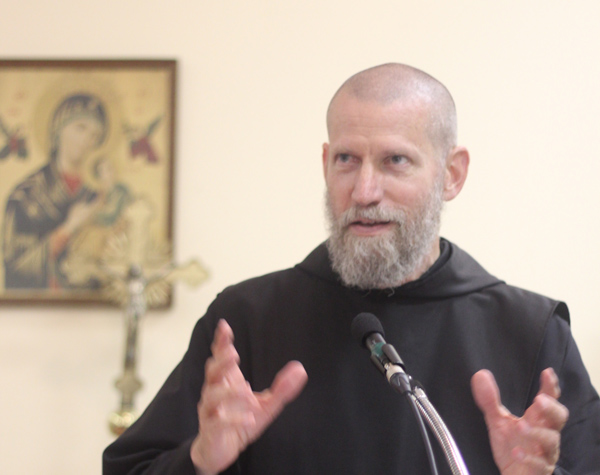
SULLIVAN’S ISLAND—Benedictine Father Cassian Folsom has reignited the ancient flame of monasticism in a small Italian town.
He is prior and founder of the Monks of Norcia, Italy, a Benedictine community founded in 1998 and based in an ancient monastery that was built at the birthplace of the order’s founder, St. Benedict, and his sister, St. Scholastica.
The community has a median age of 36 and draws members from around the world, including a South Carolina connection. Brother Augustine Wilmeth, formerly of Anderson, professed his simple vows in early September.
Father Folsom offered about 200 people a chance to learn more about the unique lives of these men when he visited Stella Maris Church on Sept. 29. His talk, “A Monk’s Perspective on the Benedict Option’” focused on ways Catholics can preserve their faith in the modern world without having to retreat behind monastery walls.
That approach has worked well in Norcia, he said, but it is not a choice everyone can make.
Those in his community live a simple life centered around the Rule of St. Benedict, who wrote it in the sixth century as a guideline for living communally under the leadership of an abbot.
The rule’s foundation is peace and its main motto is ora et labora, “pray and work.”
Norcia’s monks follow the rule by praying together nine times a day and working in the order’s brewery. They make Belgian-style beers that have been successful in Europe but aren’t available yet in the United States.
Earlier this year, they released a recording of their Gregorian chants, which reached the top of classical music charts.
Father Folsom said the strength of monastic life is its complete focus on God. The men surrender their lives in the outside world to live by the Benedictine rule, and as a result, their moral and spiritual existence is centered entirely around the Church and its teachings.
He said the monastery frequently attracts visitors who seek a little bit of what the monks experience on a daily basis.
“We are like a lighthouse to some people who are trying to sustain themselves on stormy seas,” he said. “We consider ourselves as monks but also missionaries.”
Father Folsom said the purity of the monastic approach to faith becomes more appealing to people when they see what is happening to the Church in the secular world.
Too frequently, he said, people try to adjust their faith to modern culture and in turn, have seen the Church’s impact on society watered down and weakened. This is more evident in much of Europe, he said, where Mass attendance and priestly vocations have plummeted in recent years, but it is also an increasing problem in the United States.
He said a secular surge in the U.S. has led to “The Benedict Option.” This controversial concept has emerged in some Christian circles in the states in recent years.
The name was coined by conservative blogger and author Rod Dreher and inspired by the writings of philosopher Alasdair MacIntyre in his 1981 book “After Virtue.”
MacIntyre wrote about Christians who struggle with the immorality of this age waiting for a role model in the form of a modern St. Benedict to show them how to form their own effective moral communities as a shield against the prevailing culture.
Dreher, in turn, came up with the term “Benedict Option” and suggested that traditionalist Christians withdraw from the political and public square and form their own “subculture” to preserve their beliefs against the tide of immorality and secularism.
Father Folsom acknowledged the dilemma people might feel as their values and Church teachings seem to come under attack. He encouraged the crowd to consider the idea of being in the world but not of the world, to find ways to nurture their faith while still providing a Catholic witness to the world at large.
“There are remarkable pockets of vitality in the Church worldwide and in the United States,” he said. “When people come together to practice their faith, they provide oases against the culture, a foundation of trying to build a better world.”
The key, he said, is not for everyone to retreat behind walls or cut themselves off from the world. Instead, they should work to form strong, intentional communities in their own lives where Catholic beliefs and teachings are nurtured.
He acknowledged the diverse group gathered at Stella Maris, including many families with small children, and said they offered an example of the most basic and fundamental faith community of all.
“The family should be the biggest priority, and prayer should be at the center of family life,” he said.

